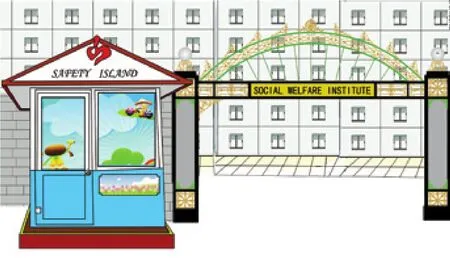Howto Protect Abandoned Babies?
Howto Protect Abandoned Babies?

LI SHIGONG
I n June 2011, a social welfare institute of Shijiazhuang, capital city of north China’s Hebei Province, built a special room, named “safety island,” outside the gate of the institute to receive abandoned babies.By doing so, the organization hopes to protect abandoned babies and save their lives.
According to the institute, the special room is equipped w ith incubators and exhaust fans. Watch keepers check the island every two hours. If someone places a baby in the incubator, he or she can press the delayed alarm button to make the baby discovered. By the end of January 2012, a total of 26 abandoned babies had been found there.
But the move of the institution has been a source of controversy. Some people argue that abandoning babies is illegal, and such a facility w ill only encourage irresponsible behavior and lead to a rising number of abandoned babies.
Responding to these voices, Han Jinhong,head of the institute, said that since the room was put into trial use eight months ago, the survival rate of the abandoned babies they received had jumped to 67 percent. The figure in the past was no more than 50 percent, as most babies the institute received were under 1 year old, suffered from disabilities or illnesses and had sometimes even been left on the streets. The special room offers abandoned babies a shelter from adverse conditions like w ind and rain, so the time they need in hospital will be greatly reduced. “We can’t change immoral behavior, but we can reduce the harm of such behavior,” Han said.
In recent days, the special room outside the social welfare institute for abandoned babies has become a great concern of the public again. Most people regard that such a shelter is the best temporary home for these poor babies.
L in X iao (www.cnhubei.com): In all ages, baby abandonment is a behavior condemned by the public. So it comes as no surprise that the “Safety Island” in Shijiazhuang, as a temporary shelter for these poor babies, met w ith great controversy.However, it’s not rational to blame it for indulging baby abandonment.
Welfare institutions have a responsibility to receive abandoned babies, and all of us have become accustomed to the continuous appearance of homeless babies in such organizations. The same is true of the special shelter built by welfare institutions. In nature, as a part of the welfare home, a special shelter for abandoned babies built by welfare institutions symbolizes the extension of the functions of these organizations. In this sense, the “safety island” in Shijiazhuang deserves public recognition and praise.
Despite the fact that baby abandonment is prohibited by law, such cases keep emerging in China. Take southwestern Guangxi Zhuang Autonomous Region for example. From 2002 to 2005, the Social Welfare Home of the region received more than 13,000 abandoned babies, most of whom were girls. Frequent occurrence of baby abandonment reflects an absence of fam ily love and a lack of legal consciousness. Even worse, such illegal behavior always happen in remote areas, which may lead to accidental injuries or even death of these poor babies. W ith the establishment of a special shelter, the mortality rate w ill be reduced to a large extent. From this perspective, the “Safety Island” for abandoned babies in Shijiazhuang is an expression of humanity,and the initiators deserve respect and admiration.
From June to Novem ber 2011, the“Safety Island” received 21 babies, while the Shijiazhuang Social Welfare Institute registered a total of 75 babies, lower than 83 in 2010 and 105 in 2009. Statistics indicate a decline of the number of abandoned babies,proving that the above-mentioned worries are groundless.
Baby abandonment is not rare in the world today. Since it’s almost im possible to get rid of it in the foreseeable future, we should have compassion for abandoned babies and protect them from potential danger by setting up special asylums. It w ill trigger more thought about the extension of charity organizations’ functions and the understanding of the principle of “people fi rst.” In short,the “safety island” is a new form of charitable aid and is worth more resource input.
Jin Zhen (www.cqnews.net): No matter how we criticize those people who abandoned their children, the fact is that a good number of young parents secretly desert their babies.In most cases, these irresponsible parents can’t afford to raise a child who may suffer from congenital diseases or are born unexpectedly.
Each fam ily has its untold difficulties. No one would abandon his or her baby if there were other choices. Instead of leaving the babies to their own fate, it’s better to place them in shelters built by charity organizations.At least, these babies may be taken care of by voluntary workers. Even if the babies cannot survive the congenital diseases, they w ill be treated with love and care, not to mention that some babies even grow up healthily w ith the aid of the public.
Life is invaluable. If there are no such“safety islands” these abandoned babies undoubtedly w ill have their lives come to a miserable end. To avoid such tragedies, efforts should be made to relieve parents from the worries of high medical charges. As individuals’ strength is lim ited, the government should give full play to its functions, helping these parents raise the babies by allocating special funds for free medical treatment of birth defects.
Xiao Chang (Xi’an Evening Post): Any organization, whether hospitals or welfare homes, should stick to the principle of humanism. When these institutions admit abandoned babies unconditionally, it seems that they have given tacit encouragement to the w rongdoings of the parents. But the top priority should be given to the rescue of these poor babies.
Of course, people who abandon babies should be punished for their immoral and illegal behavior. But at the same time, we should recognize that these babies are innocent and should not suffer for the irresponsible acts of their parents. It is no different from abandoning the babies for the second time if we refuse to set up such asylums for fear of encouraging their parents . In short, it’s empty talk to oppose the establishment of such “safety islands.”
Some people argue that society has never refused to help these babies, since abandoned babies are always adm itted by orphanages once they are discovered. They believe if the babies have to be left in the w ilderness or on the streets, their parents w ill hesitate to do so.However, if they can abandon their babies in special asylums like the “safety island’ in Shijiazhuang, the parents w ill feel less guilty.Here we should make it clear that it is the government that should be responsible to curb the phenomenon of abandoning babies, rather than charity organizations, which should be comm itted to providing poor babies w ith a warm fam ily. From welfare institutions’perspective, saving abandoned babies is an urgent task even if there is a contradiction between setting up asylums and eliminating abandonment.
Jia Xijin (The Beijing News): We should not relate the establishment of the speical room outside the social welfare institution to eliminating abandonment.
The topic has also stirred up disputes in other countries. From the perspective of the law, if a baby is placed in the special incubator, are the police still entitled to look for their parents and impose punishment on them?Some experts believe the hardship and bitterness the abandoned babies may experience w ill make their parents feel guilty. In this regard, helping these babies w ill assuage the sense of guilt of their parents, which may lead to the indulgence of the breach of law.
Despite opposing voices, similar acts are employed in many other countries. For example, in countries like Britain and the United States, which have a great number of illegal imm igrants, there are special organizations committed to helping these immigrants earn a livelihood and campaign for human rights.Some aid organizations even provide drug addicts w ith clean injection needles and m ild drugs like methadone as alternative treatment.
If illegal immigration cannot be stopped,should we protect the basic human rights of illegal imm igrants? If drug abuses cannot be eradicated, should we help prevent drug addicts from related diseases? If baby abandonment cannot be completely elim inated,should we give these babies a chance to live?
It seems that making a choice is difficult.First, it is normal to be imperfect. Second,
there is no prerequisite for human rights. No human being, whether illegal imm igrants or drug addicts or abandoned babies, should be sacrificed to solve social problems. Third,society plays a different role from the government, as the former is more tolerant.For example, when the government is busy addressing social problems like baby abandonment, drug taking and illegal imm igration,society is committed to saving abandoned babies, decreasing the chance of being infected w ith drug-related diseases, and reducing the suffering of illegal imm igrants. If there is no perfect solution to a social problem, we should at least deal w ith it to the best of our abilities.
Dear Readers,


